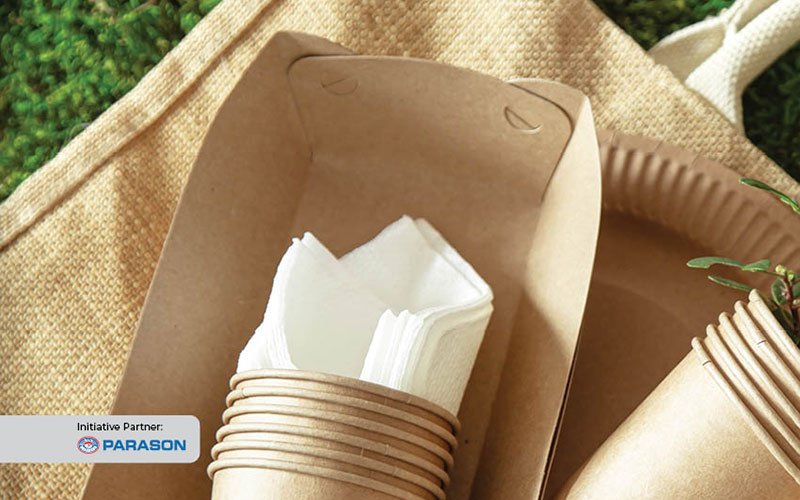
With the growing concern for environmental impact, there is an increasing demand for eco-friendly options instead of plastic tableware. The negative impact of plastic-based materials is prompting manufacturers and consumers to look for safer and biodegradable options, driving the growth of the compostable tableware market.
On average, the United Nations reports that the world produces 430 million tons of plastic annually, with two-thirds used briefly. Each day, the equivalent of more than 2,000 garbage trucks full of plastic is discharged into oceans, rivers, and lakes. India ranks third globally, generating 5.5 million tons of single-use plastic waste. In 2018, Prime Minister Narendra Modi declared India’s plan to eliminate single-use plastic by 2022. As of July 1, 2022, India has enforced a nationwide prohibition on the manufacture, import, storage, distribution, sale, and use of specific single-use plastic items including plates, cups, glasses, as well as utensils such as forks, spoons, and knives.
The negative impact of plastic-based materials on the environment is prompting manufacturers and consumers to look for safer and biodegradable options, driving the growth of the compostable tableware market. Compostable products, such as those made from sugarcane bagasse, bamboo, rice bran, rice straw, rice husk, and palm leaves, are designed to decompose naturally and quickly, without leaving harmful residues.
When asked about the motivation behind Pakka’s introduction of the brand Chuk to the market, Mr. Satish ChamyVelumani, Business Head of the Compostables Division at Pakka, states that it was driven by the goal of creating a cleaner planet. He highlights that the daily consumption of plastic tableware in the country amounts to approximately 2000 tons, while all Indian manufacturers together produce no more than 30 tons per day. This indicates that they currently only have a market share of around half a percent, leaving a significant 99.5 percent untapped market potential to capture.
With the growing concern for environmental impact, there is an increasing demand for eco-friendly options instead of plastic tableware, according to Mr. Madhure S. Desarda, Director at Parason. He suggests that regulatory pressures leading to bans or restrictions on single-use plastics have created new opportunities. Additionally, consumer preferences play a significant role as consumers now prioritize products that align with their values. A survey by Rakuten Insight on sustainable consumption in India revealed that the majority of consumers are willing to pay more for goods that are sustainably produced or environmentally friendly. Furthermore, a report by Future Market Insights indicates that businesses are adopting eco-friendly alternatives and sustainable practices to enhance their corporate social responsibility (CSR) reputation. The influence of public opinion, shaped in part by media coverage of environmental issues and educational campaigns highlighting the adverse effects of plastic pollution, cannot be understated.
Watch: Top Paper Companies 2023
Production
Pakka, with a production capacity of 300 metric tons per month at its Ayodhya facility, initially focused on tableware such as bowls and plates. The company is now expanding its delivery solutions. About two years ago, it introduced delivery containers, which faced some challenges due to technological limitations, according to Mr. Satish. Now, after addressing those issues, Pakka is launching an extensive range of delivery solutions, including multi-compartment meal trays, containers, cups, and more, as part of an evolutionary process. To keep up with increasing demand, the company has outsourced manufacturing to five companies, aiming to boost overall capacity to 600 metric tons per month, as per Mr. Satish.
India’s varied cultural background and flavorful culinary traditions are sparking a rising interest in discovering new foods and dining adventures among the population. This trend has led to the growth of niche restaurants providing unique and creative dining experiences. The growing popularity of ordering food online, changing lifestyles, and urbanization are driving the expansion of the biodegradable tableware and packaging market in India.
Markets
The Northern region has emerged as the top player in the market, securing a significant portion. The online meal delivery market in this region is rapidly growing. This growth in food delivery has led to an increased demand for packaging materials in Northern India. Restaurants and businesses are exploring more sustainable food packaging methods as global businesses and consumers become more environmentally conscious. Mr. Satish states, “Approximately 60 percent of our sales come from the Northern region. However, our main market focus has consistently been on Quick Service Restaurants (QSRs) and institutional catering, which includes large industrial caterers and entertainment facilities.”
In India, urban hubs such as Mumbai, Delhi, Bangalore, Chennai, and Kolkata, are key areas where our products are in high demand due to their large populations and growing emphasis on eco-friendly alternatives, according to Mr. Madhure. He emphasizes that internationally, countries in Europe, North America, and parts of Asia-Pacific with well-established markets for eco-friendly products offer attractive opportunities for expansion in the molded fiber industry.
Distribution
The distribution strategy for biodegradable tableware and packaging products in India is believed to have a significant impact on the market’s performance. Companies in the sector employ a dual approach, utilizing both offline and online distribution channels. Offline channels entail forming partnerships with distributors and wholesalers to broaden retail distribution on a national scale. One of the key sales channels in the industry consists of mono-brand or independent stores specializing in biodegradable tableware and packaging products. Saattvic Ecocare has partnered with distributors to sell its products in the B2C market, as Ms. Hashveen Bedi, a Partner at the company, asserts that reaching every location independently is unfeasible. Pakka’s business is divided between B2B and B2C, with B2B accounting for approximately 90-95 percent of its revenue. “We needed to ensure our product’s availability across the country, particularly in major cities. Therefore, we enlisted around 18 partners nationwide to cover all metros and tier 1 cities,” Mr. Satish explains.
Saattvic Ecocare is experiencing nationwide demand as customers are increasingly aware of their needs. While initially focusing on serving individual customers nationwide, the company is now exploring partnerships with business-to-business distributors throughout India, according to Ms. Hashveen. Apart from online platforms, Parason has collaborated with physical retail outlets, supermarkets, and specialty stores in different cities and towns. This enables us to reach customers who prefer in-person shopping or do not have online shopping options, states Mr. Madhure.
Also Read: Parason: Diversifying to Meet Diverse Needs
Growth and Future
According to Grand View Research, the market size for biodegradable tableware and packaging products in India was USD 2.06 billion in 2023 and is forecasted to grow at a 6.0 percent compound annual growth rate (CAGR) from 2024 to 2030. The global compostable tableware market is dominated by a few large vendors who hold the majority of the market share. Manufacturers of compostable tableware are investing heavily in research and development to introduce eco-friendly products. Key players are focusing on expanding their product offerings and engaging in mergers and acquisitions, as highlighted in a report by Transparency Market Research. There is significant potential for growth in the coming years, with the Indian market poised to grow faster than its international counterparts, thanks to support from MSME and other relevant ministries, according to Mr. Sunil Kumar Juneja, Managing Director of Schön Ultrawares, the company behind Grabeco. Ms. Hashveen notes that the hospitality industry is expanding, with more customers dining out, presenting opportunities for innovation and improved service to drive growth in this sector.
The food industry is increasingly focusing on eco-friendly and sustainable products. Numerous restaurants have switched to using only disposable plates, glasses, and utensils to avoid washing items that were previously used. Furthermore, single-use disposable menus have taken the place of traditional ones, and condiment dispensers such as salt and pepper shakers, as well as ketchup and mustard bottles, have been eliminated from tables. Salt and pepper are now available in small paper packets, while ketchup and mustard are served on a plate and poured from a larger container.
Last June, the Bureau of Indian Standards (BIS) introduced quality guidelines for biodegradable food utensils in response to increasing demand. The standard “IS 18267: 2023” outlines criteria for materials, production methods, performance, and hygiene standards for biodegradable utensils. BIS recommends using agricultural by-products like leaves and sheaths as the preferred materials for items such as plates, cups, and bowls. The guidelines also specify suitable plant parts and trees to use, along with techniques such as hot pressing, cold pressing, molding, and stitching. Emphasizing smooth surfaces and rounded edges, the standard prohibits the use of chemicals, resins, and adhesives. By following these standards, manufacturers can produce utensils that are free from harmful additives, promoting consumer health and well-being. Such development is indicative enough to suggest that the segment is growing and there are enormous prospects.



